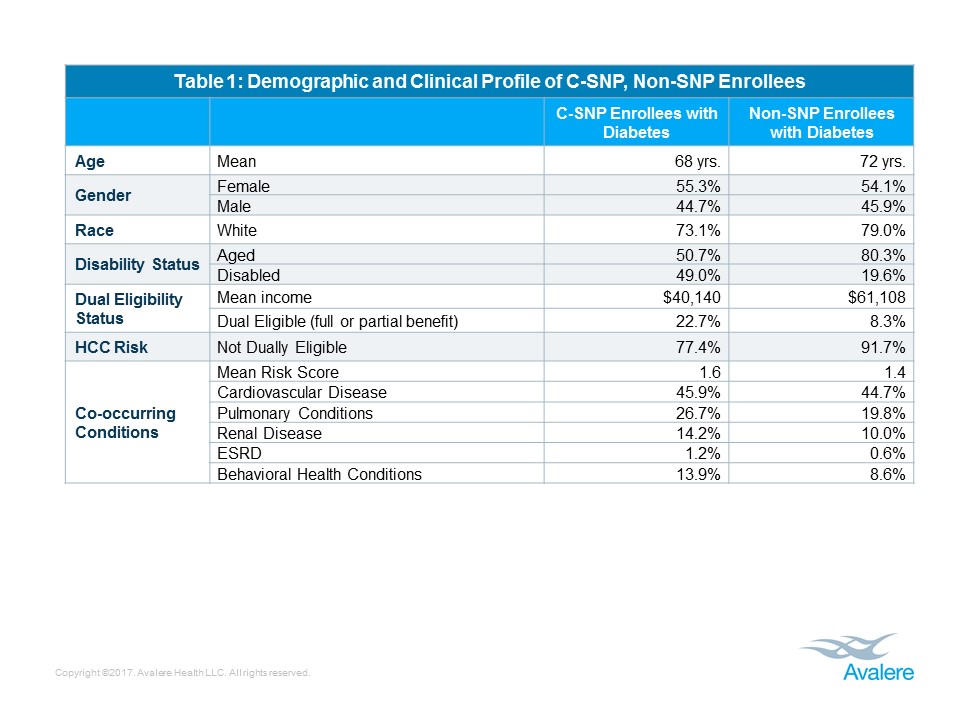Beneficiaries in Specialized Diabetes-Focused Medicare Plans Have Fewer Hospitalizations
Summary
Compared to beneficiaries with diabetes who are enrolled in other Medicare Advantage plans, enrollees in special needs plans experience better outcomes, after adjusting for demographic and clinical factors.New analysis from Avalere Health highlights how specialized Medicare Advantage (MA) plans-called chronic condition special needs plans (C-SNPs)-improve outcomes and appropriate utilization of care for their enrollees relative to other non-SNP Medicare plans. Avalere found that MA beneficiaries with diabetes enrolled in a diabetes-focused C-SNP are more likely to receive primary care services, less likely to use inpatient care, and more likely to be adherent to their antidiabetic medications than beneficiaries with similar demographic and medical profiles enrolled in non-specialized plans.
“Outcomes for beneficiaries enrolled in C-SNPs were consistently better across primary care and inpatient care,” said Cara Kelly, Vice President at Avalere. “Importantly, C-SNP enrollees also received more diabetes-specific services, including antidiabetic medications and blood glucose testing.”
SNPs provide targeted services to MA beneficiaries who are institutionalized, are dually eligible for Medicare and Medicaid, or have a severe or disabling chronic condition. SNPs have been available for more than 10 years, and there are more than 2 million SNP enrollees in 2017. C-SNPs that are focused on severe or disabling chronic conditions enroll approximately 15% of all SNP beneficiaries. These plans focus on one or more conditions, such as diabetes mellitus alone or in combination with co-morbid conditions.
Avalere used Inovalon’s proprietary MORE2 Registry® to compare outcomes for beneficiaries with diabetes enrolled in diabetes-related C-SNPs to beneficiaries with diabetes enrolled in other non-SNP MA plans for this study. Avalere calculated a “C-SNP effect” by comparing actual versus expected outcomes for C-SNP enrollees (Figure 1). Avalere estimates that C-SNP enrollees with diabetes were:
- 38% less likely to be admitted to a hospital than they would have been in a non-SNP plan
- 32% less likely to be readmitted to a hospital following an inpatient stay
- 22% more likely to have a primary care visit
- 10% more likely to have had a blood glucose (HbA1c) test
- 6% more likely to fill (and refill) a prescription for an antidiabetic medication
Avalere experts note that the results are compelling given key differences between the two populations.
“This study sheds new light on how specialized plans can positively impact enrollee outcomes,” said Dan Mendelson, president at Avalere. “As Congress and CMS continue to refine SNP policy and requirements, these results demonstrate the value that specialized plans can provide to beneficiaries and the Medicare program.”
According to the analysis, C-SNP enrollees have worse health status than non-SNP enrollees based on average risk scores (Table 1). C-SNP enrollees are more disadvantaged overall compared to other MA enrollees: they are twice as likely to be disabled (49.0% vs. 19.6%), are more likely to be dually eligible for Medicare and Medicaid (22.7% vs. 8.3%), and have lower incomes ($40,140 vs. $61,108). In addition, C-SNP enrollees are more likely to suffer from chronic co-morbidities including pulmonary conditions, renal disease, and behavioral health conditions.
Access the report here.
Funding for this analysis was provided by the Anthem Public Policy Institute. Avalere maintained full editorial control.
Methodology
Avalere used Inovalon’s proprietary MORE² Registry to analyze C-SNP and non-SNP beneficiaries with diabetes. This database contains information on demographics, enrollment, and individual medical encounters and prescription drug fills for over 159 million unique individuals from 2000 through 2017, including Medicare Advantage, managed Medicaid, and commercial (including Affordable Care Act-associated) plans. For this analysis, Avalere created a HIPAA-compliant safe harbor version of the MORE² Registry with two additional sets of information.
One source of information is the type of Special Needs Plan (SNP), if any, in which each beneficiary is enrolled, using the Medicare Advantage contract number and plan benefit package indicator. Plans were identified as being: (1) a SNP specializing in diabetes, alone or in combination with other conditions; (2) some other type of SNP; or (3) a non-SNP. Avalere restricted this analysis to diabetic enrollees in diabetes-focused SNPs or non-SNPs (i.e., groups 1 and 3). The second additional source of information is an extract of data from the Acxiom Infobase® Geo database that provides the median household size and mean household income for each ZIP+4 (nine-digit) code in the U.S.
To identify an average “C-SNP effect” (the average change in each outcome due to enrollment in a diabetes C-SNP) for people with diabetes, Avalere adopted an approach in which the actual average performance of diabetes C-SNPs is compared to an estimate of what the plan’s enrollees would have achieved on these outcomes were they instead enrolled in a non-SNP MA plan. To do this, Avalere first estimated logistic regression models of each outcome on a set of demographic, socioeconomic, and diagnostic factors using only the non-SNP plan enrollees. Avalere applied these models to the diabetes C-SNP population and calculated the percent difference in average actual versus expected outcomes among this population.
Learn More






